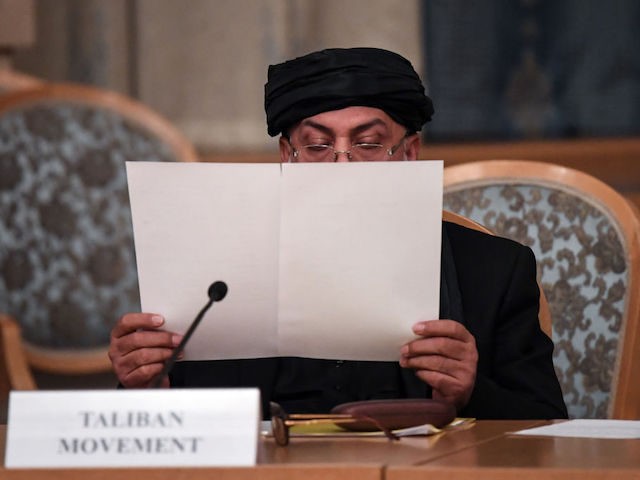The U.S. and the Afghan Taliban focused their two-day round of peace negotiations in the United Arab Emirates (UAE) this week on ending the more than 17-year-old American military presence in Afghanistan, a long-stated goal of the terrorist group, a spokesman for the jihadi organization stressed.
On Tuesday, Zabihullah Mujahid said in a statement, “Talks in Abu Dhabi are taking place with the United States about ending the occupation and American intervention. Nothing about an interim government, ceasefire, elections nor any other internal issue is being discussed, rather the main topic is the American occupation.”
In a separate statement issued the same day, he reiterated:
Yesterday, the delegation of [the Taliban] held extensive rounds of meetings with the high-ranking officials of Saudi Arabia, Pakistan and United Arab Emirates in Abu Dhabi. Talks revolved around withdrawal of occupation forces from Afghanistan, ending the oppression being carried out by the United States and her allies and views were exchanged with the said countries about peace and reconstruction of Afghanistan. Moreover, preliminary talks were held with the said countries along with the State Department’s Special Representative Zalmai Khalilzad at the end of the day. And meetings in this negotiations process shall continue today.
The Trump administration, which has intensified efforts to end the Afghanistan war, has made “political reconciliation” between Kabul and the Afghan Taliban the primary tenet of its South Asia strategy.
A two-day round of talks between the Taliban and Trump’s Afghan peace envoy Zalmay Khalilzad that started Monday took place in Abu Dhabi in the presence of officials from Saudi Arabia, Pakistan, and the UAE — the only countries that officially recognized the terrorist group’s regime during its five years of oppressive rule in Afghanistan.
The “biggest obstacle to peace is the occupation of Afghanistan and bringing it to an end,” the Taliban spokesman stressed after the negotiations, referring to the U.S.-led international military mission.
“Future negotiation meetings shall continue after deliberations and consultations by both sides with their respective leaderships,” Mujahid added.
“Mujahid again rejected as groundless reports that issues such as a temporary cease-fire, peace talks with the Kabul administration, installation of an interim Afghan government and future elections also came under discussions with Khalilzad’s team,” Voice of America (VOA) noted, adding, “The United States and the Taliban have concluded two days of marathon peace talks in the United Arab Emirates, promising to meet again in the Gulf country for another round ‘to complete the Afghanistan reconciliation process.'”
Pakistan, which the United States has repeatedly accused of willingly serving as a sanctuary for Afghan Taliban terrorists, took credit for facilitating the latest round of talks.
The ultimate goal of the negotiations is to convince the Taliban to negotiate directly with Kabul, which the jihadi group considers to be an illegitimate regime imposed by foreign powers.
Taliban jihadis have long insisted on the complete withdrawal of U.S.-NATO troops, a move that appears to be on the same page with the many Americans who have grown tired of the war and wish U.S. troops to return home.
Retired U.S. Army Col. Chris Kolenda, a former U.S. ambassador, told the Daily Beast in August that the jihadi group might be willing to abandon their long-held demand that U.S.-NATO forces must completely pull out from Afghanistan.
Echoing the retired colonel, the Wall Street Journal (WSJ) noted this week, “Taliban officials have shown in their talks with the U.S. since July some willingness to moderate the group’s absolutist demands, accepting, for example, an incremental withdrawal of American forces over an extended period of years, people familiar with the talks say.”
The Trump administration has described victory in the 17-year-old war as reinstalling— as a legitimate political power in the country — the same Afghan Taliban jihadist group American forces overthrew in late 2001.
In June, U.S. Secretary of State Mike Pompeo suggested that everything, including the presence of U.S-led coalition troops, is up for discussion in Afghanistan.

COMMENTS
Please let us know if you're having issues with commenting.